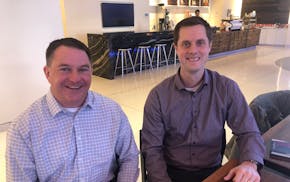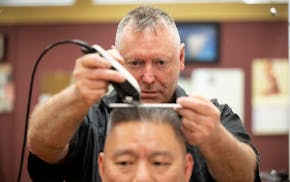Vibes founder Jackson Mann is glad he didn't take the bait from a shark last year.
A nervous, then-28-year-old Mann, made a January 2017 appearance on "Shark Tank" in search of $100,000 from one of the investment professionals in return for a 20 percent stake in his fledgling company.
He declined millionaire Kevin O'Leary's offer of $100,000 for 35 percent, plus $2 for every pair of the high-end Vibes earplugs sold.
The other sharks thought $23.99 for a pair of reusable earplugs was too expensive.
Mann walked away empty-handed … bettered if not enriched by the experience.
"Shark Tank was fuel to the fire," Mann recalled. "It gave us a boost. The exposure is worth it, if they don't make you look like a fool.
"And we left the Shark Tank confidently."
Moreover, sales grew from $120,000 in 2016 to $2 million in 2017.
And Mann, who has been on the road for weeks in his van visiting the South by Southwest media festival in Austin, Texas, concert promoters and venues, universities, audiologists and other prospects, is still the 100 percent owner of a company he expects to double in sales to $4 million this year.
Mann, now 29, is a University of St. Thomas graduate from Wayzata who worked for 2½ years in supply-chain and logistics for Cargill before joining an international travel agency for a while.
"I'm just not much of a corporate guy," he said. "I'm more of a free spirit. But I learned and saved some money.
"We completely 'bootstrapped' Vibes ourselves. The startup costs [of $20,000-plus] included the 'R&D,' developing the machine tooling and a first, small run of inventory [through a contract manufacturer]."
He described Vibes Hi-Fidelity Earplugs as a high profit-margin product that has generated positive cash since last year.
Mann started investigating hearing protection after the live-music buff ruptured his eardrum several years ago at a concert.
Mann turned for insight to specialists at the University of Minnesota's Department of Speech-Language-Hearing Sciences lab.
He wanted a high-end reusable product, which unlike traditional foam earplugs that muffle sound, would lower the volume to a safe, comfortable level, whether at a concert or noisy work site, while still allowing the wearer to hear clearly.
"I pretty much leaned on people smarter than me," Mann said. "I really searched different types of products that were in a similar space. I worked with U of M audiologists on design prototypes. The startup costs were low because we went from computer-aided design to low-cost 3-D printing and tests.
"The problem with [cheap, throwaway] foam ear plugs is that you take out the treble, the highs. It's like being in the next room and you just hear the thumping of the bass. You lose the highs. We equally reduce the frequency, from bass to treble. The sound is not distorted. It's like adjusting the volume."
Mann's initial target market was concert attendees.
It has broadened to motorcycle riders, fitness-class athletes who exercise to loud music and instructors; nightclub crawlers and members of college bands at Penn State, the University of North Carolina and elsewhere.
The experience has been enlightening for Mann.
Vibes seem to work with people who are extremely sensitive to sound, including kids with hearing disorders and some forms of autism.
Mann has been moved by young people who thanked him because they no longer have to wear an earmuff-type product to a prom or concert.
That experience led Mann and Vibes to be a business partner of the Autism Society of America.
Vibes donates 5 percent of its top-line revenue to the Hear the World Foundation. That nonprofit organization supports low-income people around the world with hearing loss, particularly children.
Vibes, with a south Minneapolis headquarters staff of just four, outsources manufacturing and distribution through a Minnesota fulfillment center.
Most sales occur online through its website at www.discovervibes.com, Amazon and Walmart online.
Spencer Johnson, the founder of Sota Clothing, met Mann several years ago when they lived in the same triplex. He considers Mann a business peer, adviser and big-hearted capitalist who is growing what has become an international business.
"It's inspiring seeing a friend take a dream and make it a reality," said Johnson, 32.
Mann doesn't regret turning down the Shark Tank offer.
Will Vibes turn him into the next Minnesota millionaire?
"I'm not shooting for a wealth number," he said. "But that would be an outcome, generating wealth, of running a successful business.
"My main goal is to focus on helping people protect their hearing health and create improved listening experiences, while, in turn, helping those who already have hearing loss gain the ability to hear."
Neal St. Anthony has been a Star Tribune business columnist and reporter since 1984. He can be contacted at nstanthony@startribune.com.

St. Anthony: 'Patient' investing paying off for St. Paul's Hill Capital

Jennifer Smith, leader of Burnsville's Innovative Office Solutions, has died

St. Anthony: Medical professions in Minnesota need more people of color in their ranks


